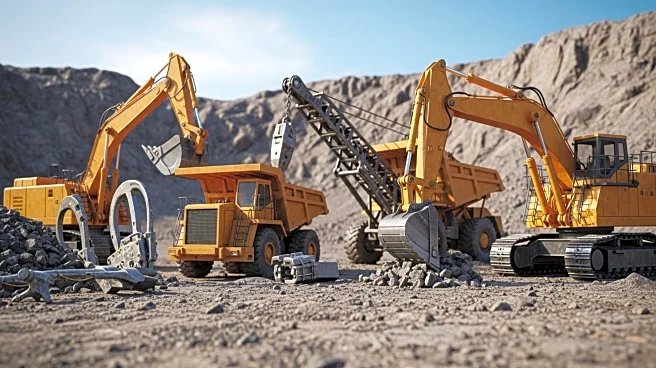What's Happening?
Azumah Resources Ghana Limited has denied reports that Engineers & Planners (E&P) has acquired its Black Volta and Sankofa gold projects. The company asserts that it remains the lawful owner and operator of these projects, despite claims from multiple Ghanaian media outlets that E&P has completed a share transfer agreement to acquire Azumah Resources Ghana Ltd and Upwest Resources Ltd. The dispute involves gold mining concessions in Ghana's Upper West Region, which could bring over $100 million in investment and create more than 1,400 jobs. Azumah's Chairman, Prof. Prince Amponsah, has labeled the takeover reports as false information intended to mislead the public. E&P, owned by Ibrahim Mahama, insists it has taken control following successful share transfers, although Azumah plans to challenge this in the International Court of Arbitration.
Why It's Important?
The ownership dispute over the Black Volta and Sankofa projects is significant due to the potential economic impact on Ghana's Upper West Region, one of the country's poorest areas. Both companies have promised substantial investment and job creation, making the resolution of this dispute crucial for local communities. The situation also highlights concerns about Ghana's regulatory oversight and investment climate, as Azumah warns that any forced transfer could be seen as expropriation, potentially leading to claims exceeding $1 billion. The outcome of this legal battle could influence investor confidence in Ghana's mining sector, which is under scrutiny for regulatory consistency and property rights protection.
What's Next?
Azumah Resources plans to apply to the International Court of Arbitration to prevent what it terms an unlawful seizure by E&P. This legal challenge could delay the development of the projects, which both companies claim are ready for construction. Investors will be closely monitoring how Ghanaian authorities handle the competing claims and whether the country's regulatory framework can provide the certainty needed for major mining investments. The Lands Minister, Emmanuel Armah-Kofi Buah, has not commented on the dispute, despite being referenced in statements from both companies.
Beyond the Headlines
The dispute raises broader questions about the protection of property rights and the consistency of regulatory practices in Ghana's mining sector. As the government seeks to increase local participation in natural resource extraction, the handling of this case could set a precedent for future disputes and impact the country's attractiveness to international investors. The legal proceedings may also bring attention to the ethical and legal dimensions of resource ownership and the balance between foreign investment and local economic development.









